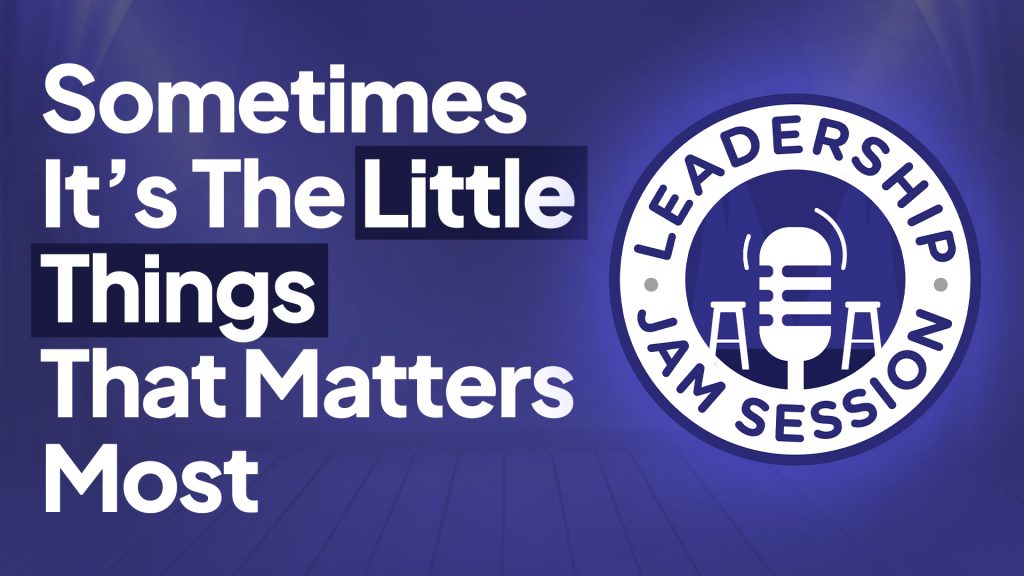Sometimes It’s the Little Things That Matters Most

How do great leaders approach team management?
Today’s guest is Scott Holmes, a good friend who used to work with me at a previous company.
Scott is a great leader and has over 30 years of experience in the healthcare industry. He is currently the vice president of the commercial business group at a startup biotech company.
In this week’s episode of the Leadership Jam Session Podcast, Scott joins me to talk about his experiences as a leader, why trust is the key to team building, and the importance of giving back to your employees and the community.
We’ll also talk about one of the most critical aspects of team management; the little things we do as managers that impact our employees personally.
Scott’s leadership journey
As I mentioned earlier, I had the experience and the privilege of working closely with Scott and his team at a company a while back.
Scott was a phenomenal leader at the company. People loved to work for him, and he had a reputation for building high-performing, cohesive teams.
His department, the Patient Support Team, was responsible for providing a lot of financial support-free drugs to patients along the way.
It’s easy to see why his department was extremely valuable to patients to the organization, but building solid teams didn’t come without its fair share of challenges for Scott.
While the Patient Support Team was high performing and consistently delivering great communicators, there were significant difficulties behind the curtain, primarily because of corporate immaturity.
Emotional intelligence was certainly not in an optimal position, and Scott’s team was highly competitive. This meant that many decisions he made often felt like favoritism to others.
But in Scott’s experience, that isn’t the only challenge there is when building solid teams.
When asked to build a team for a pilot project at the company he currently works in, he was determined to make it work.
Scott knew how high the stakes were; he would no longer be with that company if it failed.
Yet, he was willing to take the risk; Scott was confident that having the right people focused on delivering exceptional results and reliable customer service was all he needed for his team to be successful and have the opportunity to expand.
After just two or three months, the pilot was proven to be effective, and the company decided that they would expand this team.
So, what are the techniques and strategies that helped Scott become such a great team-builder?
The best way to build trust within a team
For Scott, the secret to being a good team-builder lies in the little things we do as managers that impact our employees at a personal level.
One example from Scott’s experience describes this mindset perfectly.
His entire team would have to travel out of state from time to time, and one time a team member needed to take a trip.
He approached Scott and told him that the stress he was dealing with ultimately boiled down to a family situation; the employee had a young child, and his wife worked far from home.
Every time this employee needed to travel, his wife would have to adjust her work schedule, which was not so easy for her to get the child to daycare or preschool.
Scott offered him a simple solution: he lived about 10 minutes from his employee’s home, so he could pick up his son early, drop him at daycare and even pick him up in the evening if necessary.
Scott’s offer completely changed the employee’s mood, and even his overall performance improved thanks to being relieved of that stress.
As you may have imagined, some of the other employees interpreted Scott’s actions as favoritism.
But having grown in a family with several siblings, Scott knew exactly how to deal with these perceptions.
He had learned from his mother the importance of treating everyone fairly and equally, but also knowing that each person requires different things.
While that one employee required Scott to go pick his son up and drop his son off at daycare, another employee just wanted a little bit of flexibility when working from home when she needed to travel to the west coast.
So, Scott believes the secret to being a great team builder is to find the opportunities to treat everyone equally but differently.
Scott’s 3 tips on how to manage teams at a personal level
1. Don’t overcomplicate things
Whenever you’re building and managing teams, Scott’s first piece of advice is to keep things simple.
For some employees, it would be okay for them to accept some additional assistance from you as a leader, in whatever form.
But this may not be true for other employees.
As long as you are comfortable with what your intentions are and you’re able to read the room, you’ll be able to create a genuine sense of trust with your employees.
2. Sometimes, it’s okay to cross the boundaries of work vs. personal
First off, you’ve got to assess the situation to ensure that your assistance is welcomed when dealing with employees personally.
You need to know the employee to determine whether they would appreciate it as a gift and nothing more than that or not.
Scott believes that it’s also crucial to wait until the employee directly brings it to your attention.
Any attempts to be proactive in this regard could send a different, unintended message to the employee, something you should always try to avoid.
3. Create a positive environment
The best way to guarantee positive reactions from your employees whenever you offer them personal assistance is to create a comfortable environment.
Let’s go back to Scott’s experience with the employee whose son he offered to pick up from daycare.
He knew the employee trusted him, so he would most likely be grateful for his help.
Scott had created a comfortable environment, so his employee was open to sharing what was happening outside of work, knowing that as a leader, but more importantly, as a human, Scott would try to help him find a solution.
Key Takeaways
– Episode intro (00:00)
– Scott’s leadership style (01:25)
– The challenges of team-building in the healthcare industry (03:28)
– The problem with favoritism (05:14)
– How to support your employees (06:58)
– The best way to build trust (15:35)
– Why our experiences shape our beliefs (19:05)
– Scott’s advice on managing teams (25:12)
Leadership Resources
How are the leaders at all levels of management tackling the toughest challenges each day? Learn more at: https://sartoleadershipgroup.com

